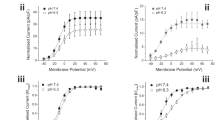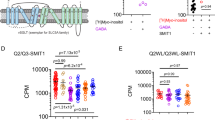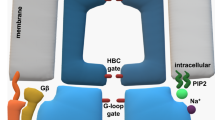Abstract
The human ether a go-go-related gene (HERG)1 encodes ion channels that produce IKr (ref. 2), a potassium current that drives repolarization in many excitable cells3,4,5. When the concentration of extracellular potassium ions ([K+]o) is raised, outward K+ current through HERG channels is paradoxically increased, despite a reduced electrochemical gradient2, but the molecular mechanism is not fully understood. Here we show that extracellular sodium ions potently blocked HERG current in K+o-free conditions, and that low [K+]o (<5 mM) in the physiological range opposed block by sodium; hence the fine tuning that extracellular K+ confers on IKr actually represents modulation of sodium block by potassium.
This is a preview of subscription content, access via your institution
Access options
Subscribe to this journal
Receive 12 print issues and online access
$209.00 per year
only $17.42 per issue
Buy this article
- Purchase on Springer Link
- Instant access to full article PDF
Prices may be subject to local taxes which are calculated during checkout


Similar content being viewed by others
References
Warmke, J. W. & Ganetzky, B. Proc. Natl. Acad. Sci. USA 91, 3438–3442 (1994).
Sanguinetti, M. C., Jiang, C., Curran, M. E. & Keating, M. T. Cell 81, 299–307 (1995).
Sanguinetti, M. C. & Jurkiewicz, N. K. J. Gen. Physiol. 96, 195–215 (1990).
Arcangeli, A. et al. Eur. J. Neurosci. 9, 2596–2604 (1997).
Chiesa, N., Rosati, B., Arcangeli, A., Olivotto, M. & Wanke, E. J. Physiol. (Lond.) 501, 313–318 (1997).
Smith, P. L., Baukrowitz, T. & Yellen, G. Nature 379, 833–836 (1996).
Wang, S., Morales, M. J., Liu, S., Strauss, H. C. & Rasmusson, R. L. FEBS Lett. 389, 167–173 (1996).
Scamps, F. & Carmeliet, E. Am. J. Physiol. 257, C1086–C1092 (1989).
Hagiwara, S. & Takahashi, K. J. Membr. Biol. 18, 61–80 (1974).
Korn, S. J. & Ikeda, S. R. Science 269, 410–412 (1995).
Hess, P. & Tsien, R. W. Nature 309, 453–456 (1984).
Ogielska, E. M. & Aldrich, R. W. J. Gen. Physiol. 112, 243–257 (1998).
Wang, S., Liu, S., Morales, M. J., Strauss, H. C. & Rasmusson, R. L., J. Physiol. (Lond.) 502, 45–60 (1997).
Roden, D. M. et al. Circulation 94, 1996–2012 (1996).
Johns, D. C., Nuss, H. B. & Marban, E. J. Biol. Chem. 272, 31598–31603 (1997).
Acknowledgements
We thank Louis DeFelice and Dan Roden for discussion and comments on the manuscript. This work was supported by National Institutes of Health (P01 HL46681) and an Established Investigator Award from the American Heart Association (J.R.B.).
Author information
Authors and Affiliations
Corresponding author
Rights and permissions
About this article
Cite this article
Numaguchi, H., Johnson, J., Petersen, C. et al. A sensitive mechanism for cation modulation of potassium current. Nat Neurosci 3, 429–430 (2000). https://doi.org/10.1038/74793
Received:
Accepted:
Issue Date:
DOI: https://doi.org/10.1038/74793
This article is cited by
-
L/N-type Ca2+ channels blocker cilnidipine ameliorated the repolarization abnormality in a chronic hemodialysis patient
Heart and Vessels (2017)
-
Life-threatening cardiac arrhythmias due to drug-induced QT prolongation
Medizinische Klinik - Intensivmedizin und Notfallmedizin (2016)
-
Congenital Long QT Syndromes: Prevalence, Pathophysiology and Management
Pediatric Drugs (2014)



